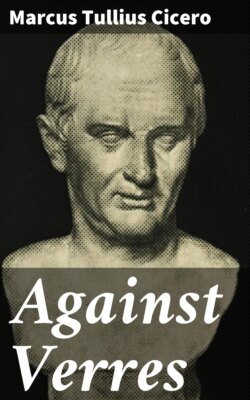Читать книгу Against Verres - Marcus Tullius Cicero - Страница 72
На сайте Литреса книга снята с продажи.
50
ОглавлениеTable of Contents
130Publius Junius, O judges, had the guardianship, of the temple of Castor. He died in the consulship of Lucius Sulla and Quintus Metellus. He left behind him a young son under age. When Lucius Octavius and Caius Aurelius the consuls had let out contracts for the holy temple, and were not able to examine all the public buildings to see in what repair they were; nor could the praetors to whom that business had been assigned, namely, Caius Sacerdos and Marcus Caesius; a decree of the senate was passed that Caius Verres and Publius Caelius, the praetors should examine into and decide about those public buildings as to which no examination or decision had yet taken place. And after this power was conferred on him, that man, as you have learnt from Caius Fannius and from Quintus Tadius, as he had committed his robberies in every sort of affair without the least disguise and with the greatest effrontery, wished to leave this as a most visible record of his robberies, which we might, not occasionally hear of, but see every day of our lives. 131He inquired who was bound to deliver up the temple of Castor in good repair. He knew that Junius himself was dead; he desired to know to whom his property belonged. He hears that his son is under age. The fellow, who had been in the habit of saying openly that boys and girls who were minors were the surest prey for the praetors, said that the thing he had so long wished for had been brought into his bosom. He thought that, in the care of a monument of such vast size, of such laborious finish, however sound and in however thorough a state of repair it might be, he should certainly find something to do, and some excuse for plunder. 132The temple of Castor ought to have been entrusted to Lucius Rabonius. He by chance was the guardian of the young Junius by his father's will. An agreement had been made between him and his ward, without any injury to either, in what state it should be given up to him. Verres summons Rabonius to appear before him he asks him whether there is anything which has not been handed over to him by his ward, which might be exacted from him. When he said, as was the case, that the delivery of the temple had been very easy for his ward; that all the statues and presents were in their places, that the temple itself was sound in every part; that fellow began to think it a shameful thing if he was to give up so large a temple and so extensive a work without enriching himself by booty, and especially by booty to be got from a minor.
